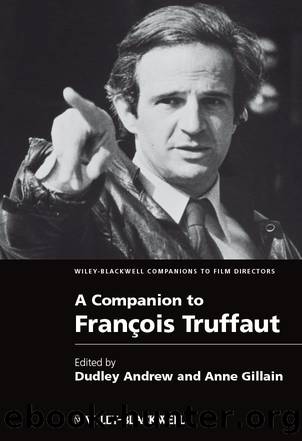Companion to François Truffaut by Andrew Dudley; Gillain Anne;

Author:Andrew, Dudley; Gillain, Anne;
Language: eng
Format: epub
Publisher: Wiley
Published: 2013-02-04T16:00:00+00:00
The End of a Friendship
This period immediately following 1968 marked the beginning of a third phase, one that would cause a brutal rupture in the friendship of the two auteurs. We can see the private manifestation of this in Truffaut’s correspondence, published in 1988, particularly in the May 1973 letter from Godard to Truffaut: “Yesterday I saw La Nuit américaine. In all likelihood no one will call you a liar, so I am doing it.” Truffaut responded to this letter with extraordinary violence, but also an extraordinarily lucid understanding of the personality of Jean-Luc Godard, a brilliant artist, but one whose sadomasochistic narcissism was often unbearable to even his closest friends.
This rupture was only indirectly public during the 1970s, glimpsed via malicious allusions from each of the two men, especially on Godard’s part, over the course of the many interviews that they gave throughout the seventies and into the eighties, until Truffaut’s death in 1984. Godard’s personal attack on La Nuit américaine (1973) gained public notoriety only in 1980 when Editions Albatros published a transcription of the lectures he delivered starting in the fall of 1978 in Montreal at the request of Serge Losique, director of the Conservatoire d’Art Cinématographique de Montréal. We know that these were largely improvised talks, Godard commenting on his own feature-length works and projecting them along with selected reels from other films. So on his second trip, discussing Le Mépris (1963), he showed three other films about cinema, and not just any three: Man with a Movie Camera (1929) by Dziga Vertov, The Bad and the Beautiful (1952) by Vincente Minnelli, and La Nuit américaine by his former friend Truffaut.
These lines from Godard’s commentary are revealing:
To me [he has had] a truly strange career. François Truffaut’s real life would be a grand film that would be horribly expensive to make. Because he has had a very strange career – when you watch his first film, The Four Hundred Blows, and you know a little bit about his life before – for me, there was a break right after The Four Hundred Blows. And I don’t know how that happened. He let himself be taken in by cinema, he became everything he hated.9
Truffaut responded indirectly to Godard in a long interview with Cahiers du Cinéma in September and October 1980, answering questions from Serge Daney, Serge Toubiana, and Jean Narboni:
You refer to Godard, but the example is a bad one because he belongs directly in the group of compulsive enviers. As far as I’m concerned, Godard’s declarations of hate no longer matter; it seems I made him lose sleep. … Even at the time of the New Wave, friendship worked differently with him. Because he was very gifted and very good at making people feel sorry for him, we forgave him for his meanness, but everyone will tell you, the devious side that he is no longer able to conceal was already there. We always had to help him, to do him favors, and wait for a low blow in return.
Download
This site does not store any files on its server. We only index and link to content provided by other sites. Please contact the content providers to delete copyright contents if any and email us, we'll remove relevant links or contents immediately.
The Kite Runner by Khaled Hosseini(4409)
Gerald's Game by Stephen King(3913)
The Perils of Being Moderately Famous by Soha Ali Khan(3781)
Dialogue by Robert McKee(3573)
Story: Substance, Structure, Style and the Principles of Screenwriting by Robert McKee(2981)
The 101 Dalmatians by Dodie Smith(2931)
The Pixar Touch by David A. Price(2735)
Confessions of a Video Vixen by Karrine Steffans(2668)
Fantastic Beasts: The Crimes of Grindelwald by J. K. Rowling(2539)
How Music Works by David Byrne(2519)
Harry Potter 4 - Harry Potter and The Goblet of Fire by J.K.Rowling(2412)
Slugfest by Reed Tucker(2411)
The Mental Game of Writing: How to Overcome Obstacles, Stay Creative and Productive, and Free Your Mind for Success by James Scott Bell(2388)
Wildflower by Drew Barrymore(2114)
Scandals of Classic Hollywood: Sex, Deviance, and Drama from the Golden Age of American Cinema by Anne Helen Petersen(2104)
Casting Might-Have-Beens: A Film by Film Directory of Actors Considered for Roles Given to Others by Mell Eila(2071)
Screenplay: The Foundations of Screenwriting by Syd Field(2051)
Robin by Dave Itzkoff(2002)
The Complete H. P. Lovecraft Reader by H.P. Lovecraft(1970)
